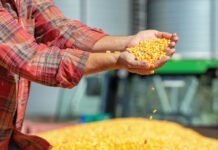The U.S. Department of Agriculture (USDA) has chosen the American Soybean Association’s (ASA) World Initiative for Soy in Human Health (WISHH) Program and key partners to implement a major poultry development project in Ghana.
The USDA Foreign Agricultural Service’s Food for Progress Program helps developing countries and emerging democracies modernize and strengthen their agricultural sectors. As a result, it improves agricultural productivity and expands trade of agricultural products.
“ASA is pleased to partner with USDA in agricultural development that supports expanded and mutually beneficial trading relationships,” said ASA President Wade Cowan. “Nowhere is there greater need or bigger potential return on investment in agricultural development than in Sub-Saharan Africa. WISHH is a trailblazer for trade.”
The United States is among Ghana’s principal trading partners, with two-way trade between the two countries reaching $1.45 billion in 2014, according to the U.S. State Department. Ghana is home to 26.4 million people, and a West African hub for business growth.
The Ghanaian government seeks to revamp the poultry industry, which has slumped in the last 30 years. “The project will contribute to increasing the supply of both meat and eggs to address ever-growing demand in Ghana”, said William Brown, Ph.D., country director of Adventist Development and Relief Agency (ADRA-Ghana), which is a partner on the initiative.“The project could trigger the growth of poultry, maize and soy industries, which will provide employment and increased income. This will culminate in poverty reduction.”
Kansas State University is a subcontractor in WISHH’s Assisting Management in the Poultry and Layer Industries by Feed Improvement and Efficiency Strategies in Ghana (AMPLIFIES Ghana).
The multi-faceted project will promote the use of improved poultry feeds, and procure feed ingredients, including 15,000 metric tons of U.S. soybean meal. It will train Ghanaian poultry producers, improve feed milling practices and products, enhance storage and handling of feedstuffs, and much more.
Today, the trends are even clearer, proving that WISHH-founding farmers planned well. According to U.S. Department of Agriculture (USDA) and other economic analysis, developing countries dominate world demand growth for agricultural products. As a result, these countries will account for 92 percent of the total increase in world oilseed and meat imports in 2013-2022.
Source: Soygrowers











